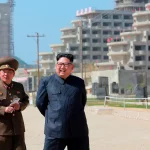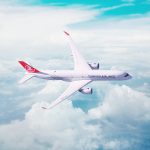Have you noticed many changes in North Korea from your first time to last time?
From my first tour in September 2012 to my final tour for Party Foundation Day in October 2015, I was fortunate enough to visit the DPRK around twenty-five times. A common question asked by travelers is whether or not I have noticed many changes in the country during that time. The answer is yes.
With regards to the tours themselves, the possibilities now seem limitless. In 2012, a group tour to the DPRK was a lot more restrictive than it is today. I got the feeling that the itinerary was set and there was no room for adjustments, regardless of how slight. Today however, the Korean guides can be open to last minute alterations to the schedule and seem wholly more relaxed when dealing with people from all over the world. Regardless of whether this more relaxed attitude is a result of a directive within KITC, something that has stemmed from an increasingly relaxed society, or came about as a result of the high number of young people starting with the company, it is certainly something that has made the tours much more enjoyable.
In addition to the more relaxed attitude of the guides, the places that tourists can now visit and the opportunities available to them have increased immeasurably in the last three years. In 2012, it would have been unthinkable that within the proceeding three years myself and the customers of YPT would take part in the Pyongyang Marathon, drink and mingle freely with hundreds of punters at a local beer bar, peruse and buy domestic products at trade fairs, spend the day farming just outside Pyongyang, surf with locals at Majon beach, or stay overnight with families in North Hamgyong. There is no reason to believe that this trend will cease and I am confident that anyone traveling to the country in the near future will experience even more incredible things than I have been able to see.
Aside from the tourism sector, I do believe that the DPRK has, in parts, changed greatly since 2012. With Pyongyang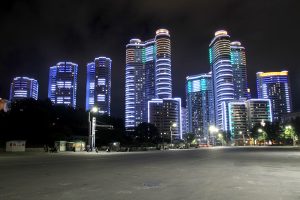
specifically, this city has been transformed from an uninspiring, atypical 1980’s-esque capital to an aesthetically beautiful one with countless parks, gardens, recreational facilities, and modern buildings dotted across both sides of the Taedong River. Within Pyongyang, it is no longer a rarity to see people with mobile phones and neither are computers only seen as the playthings of the elite. Alongside the increasing availability of electronic goods, the fashion trends within Pyongyang have changed greatly and conformity within this sector is no longer the norm. In the last few years people have managed to acquire personal wealth on a scale never before seen in the country and the capital’s current love affair with foreign products and expensive restaurants is testament to the fact that this shows no sign of slowing down.
I would be remiss however to mention only Pyongyang and neglect the regional cities. With regards to population size, the three biggest cities after the capital are Hamhung, Chongjin and Sinuiju. I have been fortunate enough to visit these cities on many occasions and although they all have a beauty in their own right, it cannot be said that they are developing at the same, or even close to the same, speed as Pyongyang. Since my first visit to these cities, any change has been negligible and although this is interesting from a tourism perspective, more money needs to be diverted from the capital to the regional cities and used to upgrade the relatively outdated infrastructure. This however is not a anomaly within developing countries and as with China, the DPRK will no doubt recognize the benefits associated with developing areas outside the capital. For this reason, those travelers who continue to visit the regional cities of the DPRK over the coming years will no doubt see a marked difference from what they look like today.
What is the most common misconception from customers regarding North Korea?
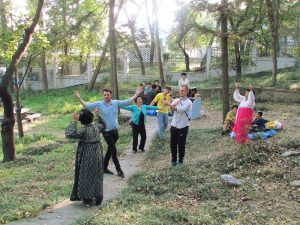 With the amount of false information that is published in even the more reputable newspapers and magazines, it is completely understandable that travelers arrive with misconceptions about the country. Many arrive believing that the north Korean people do not have a sense of humor, that the day to day life of the north Korean is completely organized and they have no free will, that everything that is happening is for the purposes of the tourists, that they do not know anything about the outside world, and that it is impossible to interact with them. On my tours I always wanted the groups to have as much interaction with Koreans as possible so we would often join in with volleyball games, football games, dancing in the park, karaoke in bars, or simply getting a picture together. I believed that spending time with the local people was the best way to tackle the misconceptions and at least allow the customers to make up their own mind instead of being influenced by writers who have never traveled to the country. Through this interaction, many customers gradually realized that Koreans do in fact have a sense of humor and love to laugh, that they are extremely friendly and hospitable, and that not everything is scripted. I think my favourite account of a Korean completely smashing this misconception was when a customer challenged her as to why we had come to the bowling alley and then the park when the itinerary had it the other way round. The guide’s response, to the surprise of the customer and the amusement of everyone else was, “shit happens.”
With the amount of false information that is published in even the more reputable newspapers and magazines, it is completely understandable that travelers arrive with misconceptions about the country. Many arrive believing that the north Korean people do not have a sense of humor, that the day to day life of the north Korean is completely organized and they have no free will, that everything that is happening is for the purposes of the tourists, that they do not know anything about the outside world, and that it is impossible to interact with them. On my tours I always wanted the groups to have as much interaction with Koreans as possible so we would often join in with volleyball games, football games, dancing in the park, karaoke in bars, or simply getting a picture together. I believed that spending time with the local people was the best way to tackle the misconceptions and at least allow the customers to make up their own mind instead of being influenced by writers who have never traveled to the country. Through this interaction, many customers gradually realized that Koreans do in fact have a sense of humor and love to laugh, that they are extremely friendly and hospitable, and that not everything is scripted. I think my favourite account of a Korean completely smashing this misconception was when a customer challenged her as to why we had come to the bowling alley and then the park when the itinerary had it the other way round. The guide’s response, to the surprise of the customer and the amusement of everyone else was, “shit happens.”
One particular misconception that is quite prevalent is that the Pyongyang Metro is for show, that locals only pretend to be going places, and that there are in fact only three stations. When I talk to guides about this it is often met with a look of incredulity; the same response that I imagine you would receive from Londoner if you posed the same question about the Tube.
If you had to recommend a book and documentary that deals with the DPRK, what would they be?
If I had to choose one book it would have be John Everard’s Only Beautiful, Please. Everard was the first British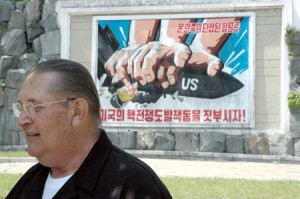
Ambassador to the DPRK and his book is neither too critical nor too celebratory; it simply recounts his time in office in Pyongyang and does so without an agenda. As someone who lived in the capital city for some time and in such a respected position, his viewpoint on the country is as valued as it is interesting and by mixing in day-to-day anecdotes with political observations, he has created a read that is extremely informative and enjoyable. Regarding a documentary, anyone who has been on tour with me in the DPRK would probably be all to aware of the answer to this question. Crossing the Line tells the story of US Army defectors James Dresnok and Charles Jenkins who, upon separately deserting their posts, crossed the DMZ into north Korea in the 1960’s. The film, produced by British filmmaker Daniel Gordon and Koryo Tours founder Nicholas Bonner, documents the men’s lives up until present day (mid 2000’s) and provides a fascinating look at just how two former US soldiers managed to somewhat integrate into north Korean society and ultimately become Korean citizens.
With regards to the DPRK and non-DPRK what have been your best experiences. Is there anything you didn’t get the chance to do that you would have liked?
With regards my trips to the DPRK I would have to say that the Pyongyang Marathon has been my favourite experience. I took groups in both 2014 and 2015 and each time was equally as incredible. That feeling of standing in the middle of Kim Il Sung Stadium and listening to the roars and chants of the capacity crowd is a feeling that I am not sure I will ever be able to replicate. It is one of those moments that even the greatest wordsmith would have trouble adequately articulating and for that reason, I won’t even try. All that I will say is that it has to be experienced to be believed and if I was to recommend any tour it would definitely be the Marathon and Kim Il Sung Birthday Tour.
Masikryong Ski Resort is one of the few places in the country that managed to elude me. I had hoped to travel to it in February 2015 but the ebola closure put an end to this plan. I do hope, however, to return and tackle the slopes with my friend Haras who is a decent snowboarder and eager to teach!
With regards to our international tours, the most memorable moment was getting to explore Chernobyl as part of the Eurasian Adventure Tour. I was pleasantly shocked at the degree of freedom our group was given in the nearby town of Pripyat and we used this freedom to fully explore the hospitals, schools, apartment buildings, fairground rides, and stadiums that make up the eerily abandoned town. I would not for a second hesitate to recommend a trip to Pripyat and Chernobyl to any traveler who likes a bit of adventure.
I wouldn’t really call it a missed opportunity because it isn’t a place I expected to travel to as part of the company, but if I had to choose one non-DPRK destination to travel to it would without a doubt be Iran. I have never heard such positive reviews about a particular country and I am eager to go and see its beauty for myself.
For anyone thinking of traveling to North Korea, do you have any advice?
The DPRK is one of those destinations where everyone who likes a bit of adventure wants to go but very few actually 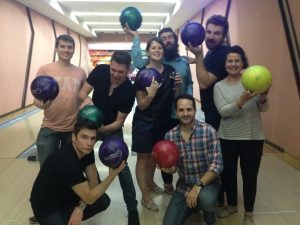 make the leap. For this reason, I will give the advice that I myself use – When you decide you want to go somewhere, book the flights as soon as possible. Airlines are among the least flexible of businesses in the world and (if you are anything like me and don’t even glance at the more expensive, refundable fares) any attempt to get a refund will be about as successful as using a 500 Euro note in Hamhung. There is always a million reasons to not do something and if you are unable to get your money back, it will probably force you to go. This has happened to me in the past and it has always worked out for the best!
make the leap. For this reason, I will give the advice that I myself use – When you decide you want to go somewhere, book the flights as soon as possible. Airlines are among the least flexible of businesses in the world and (if you are anything like me and don’t even glance at the more expensive, refundable fares) any attempt to get a refund will be about as successful as using a 500 Euro note in Hamhung. There is always a million reasons to not do something and if you are unable to get your money back, it will probably force you to go. This has happened to me in the past and it has always worked out for the best!
My other piece of advise would be to not let others influence your decision. People see the DPRK as a dangerous place to visit but this could not be further from the truth. In fact, I would go so far as to say that it is probably one of the safest countries you could travel to and the chance of any violent or non-violent offenses being committed against a tourist is close to zero. In November 2013 YPT took in two rappers from the USA who, when asked by a BBC reporter as to whether they feared for their lives, responded by stating that as young people coming from a dangerous part of Washington DC, they had never felt safer. This misconception of the DPRK as an unsafe country has reached such heights that a single female tourist remarked to me that she had lied to her grandmother and told her she was traveling to India instead (a country that over the last 5 years has seen a 7.1% increase in violent crimes against women).
What you will miss the most about leaving? Is there anything you will not miss?
Without a doubt, I will miss getting to hang out with so many cool people on a regular basis. People who come on YPT tours are usually travelers who are traveling to the DPRK in the midst of a bigger tour and often have great stories to tell. As anyone who has been to the DPRK will tell you, one day is like a week and after a one week tour of eighteen hour days it is only natural that friendships form. From leading tours into the country I have made a lot of new friends and as I continue to travel, I look forward to visiting them in their countries and reminiscing about the good old days in Pyongyang.
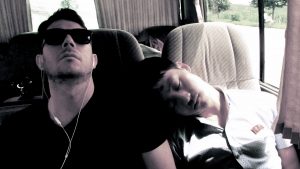 In addition to the western travelers, I will also miss the Korean guides at KITC who work harder than anyone else to make the trips special for customers. I have formed bonds with them that I previously never thought possible and although some may be skeptical, I consider more than a couple of them genuinely good friends. It saddens me that it will be difficult to keep in touch with them but when I think about whether or not I would like to return to the DPRK as a tourist, the idea of seeing them again provides the only answer I need.
In addition to the western travelers, I will also miss the Korean guides at KITC who work harder than anyone else to make the trips special for customers. I have formed bonds with them that I previously never thought possible and although some may be skeptical, I consider more than a couple of them genuinely good friends. It saddens me that it will be difficult to keep in touch with them but when I think about whether or not I would like to return to the DPRK as a tourist, the idea of seeing them again provides the only answer I need.
Lastly, I will miss my family at YPT who are some of the most incredible people you could meet. It is a company that 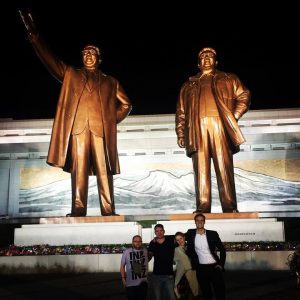 values the input of the most recently hired member of staff as much as the veterans and has a policy of going above and beyond what can be construed as good customer service. I have been part of a team that has sat up into the night to provide 24/7 assistance to those customers who have found themselves in trouble because of flight cancellations, visa issues or other situations that have made it difficult to get to China to join the tour. From Gareth who founded the company to Troy and Shan who became owners and expanded it, from Rowan, Shane, and Charlotte who are exceptional tour leaders to Sophie and Giselle who act as the backbone of the company, the entire outfit goes above and beyond to make sure the customer has the best possible experience.
values the input of the most recently hired member of staff as much as the veterans and has a policy of going above and beyond what can be construed as good customer service. I have been part of a team that has sat up into the night to provide 24/7 assistance to those customers who have found themselves in trouble because of flight cancellations, visa issues or other situations that have made it difficult to get to China to join the tour. From Gareth who founded the company to Troy and Shan who became owners and expanded it, from Rowan, Shane, and Charlotte who are exceptional tour leaders to Sophie and Giselle who act as the backbone of the company, the entire outfit goes above and beyond to make sure the customer has the best possible experience.
There really isn’t too much I won’t miss but I can say with certainty that I won’t be pining for a Yanggakdo Hotel wake-up call after a night of soju-induced karaoke and 3 hours sleep...
안녕히 가십시오!
Chris Kelly




